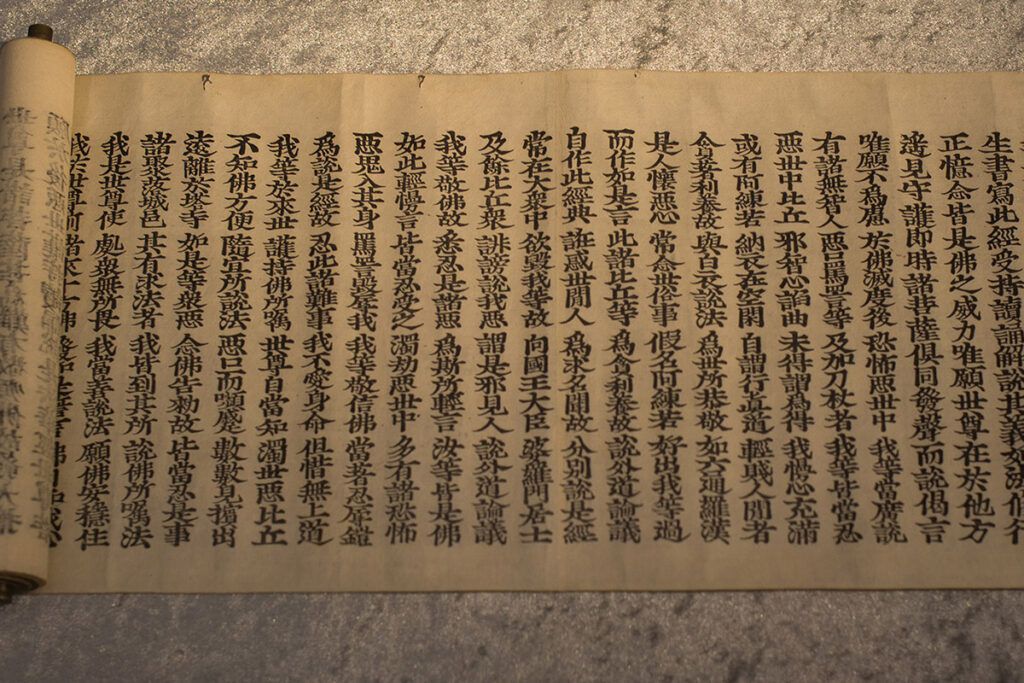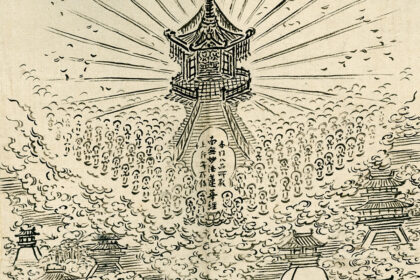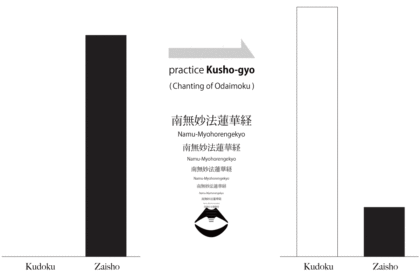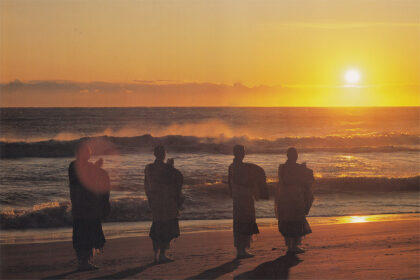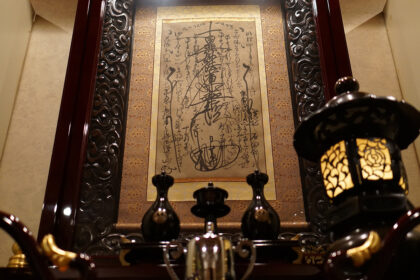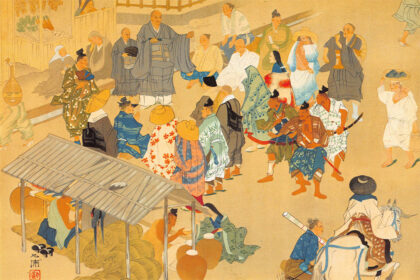<< Previous Article
The Primordial Buddha—the True Form of the Buddha (3/11)
Honmon Happon refers to the eight chapters from chapter 15, “Emerging from the Earth” (従地涌出品第十五), through chapter 22, “Entrustment” (嘱累品第二十二), of the Lotus Sutra. HBS regards Honmon Happon as the most significant teaching within the Lotus Sutra. This is because the Gohonzon (the object of worship) and the methods of Buddhist practice, tailored specifically for us living in the Mappō period (末法, Latter Day of the Law), were revealed in Honmon Happon.
Let’s briefly explore each chapter of Honmon Happon. In chapter 15, “Emerging from the Earth,” numerous bodhisattvas led by Jōgyō Bodhisattva (上行菩薩, Superior Practice Bodhisattva) emerge from the earth. Collectively, they are known as Jiyu no Bosatsu (地涌の菩薩), where “Jiyu” means “emerging from the earth” and “Bosatsu” means “bodhisattvas.” These bodhisattvas are of the highest and noblest rank, having been guided by the Primordial Buddha since time immemorial.
In the next chapter, 16, “The Life Span of the Buddha (如来寿量品第十六),” Shakyamuni Buddha reveals that his true form is the Primordial Buddha, who attained enlightenment in the distant past through the bodhisattva practice called Bosatsu-gyō (菩薩行), which involves chanting the Odaimoku and spreading it to others. He then explains that all the merits of the Buddha’s enlightenment are contained within the Odaimoku, Namu Myōhō Renge Kyō.
In chapters 17, “Kinds of Merits” (分別功徳品第十七), 18, “The Merits of Joyfully Following the Lotus Sutra” (随喜功徳品第十八), and 19, “The Merits of the Dharma-Preacher” (法師功徳品第十九), the Buddha reveals the practices for those born in the Mappō period. He also details the immense Kudoku (功徳, merits of Buddha’s enlightenment) and the types of rewards that await those who joyfully follow the teachings of the Primordial Buddha and bear the Odaimoku in mind.
In chapter 20, “Bodhisattva Never Disparaging” (常不軽菩薩品第二十), the story of Fukyō Bodhisattva (不軽菩薩) is presented as an example for practitioners of the Lotus Sutra in the Mappō period. According to tradition, Fukyō Bodhisattva bowed to people, saying,
You can become a Buddha if you practice the Lotus Sutra since you naturally possess Buddha-nature.
Some people, thinking he was mocking them, struck him with sticks and stones. Nevertheless, he evaded their blows and kept repeating, “I do not despise you. You can become a Buddha.”
In the final two chapters, 21, “The Supernatural Powers of the Tathagata” (如来神力品第二十一), and 22, “Entrustment” (嘱累品第二十二), the Primordial Buddha bequeaths the Odaimoku, Namu Myōhō Renge Kyō, containing all the merits of his enlightenment, to Jiyu no Bosatsu, led by Jōgyō Bodhisattva. He entrusts them with the mission of propagating the Odaimoku during the Mappō period.
Jiyu no Bosatsu appear exclusively in the Honmon Happon chapters of the Lotus Sutra and not in any of the pre-Lotus Sutras (爾前諸経, Nizen-Shokyō). This signifies that the teachings of Honmon Happon are intended for those living in the Mappō period, as Jiyu no Bosatsu, led by Jōgyō Bodhisattva, were directly instructed by the Primordial Buddha to spread the Odaimoku after his temporary departure from this world.
Who is Jōgyō Bodhisattva, the leader of Jiyu no Bosatsu? Let’s explore this in the next article.
Next Article >>
Jōgyō Bodhisattva (Superior Practice Bodhisattva) (5/11)

